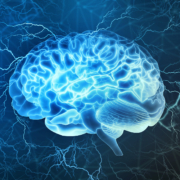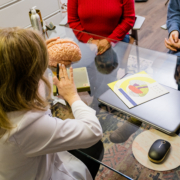How sleep problems affect the brain
The way we sleep and how our brains function the next day are intricately linked.
And, with one-third of all American adults not getting enough sleep (according to the CDC) and an epidemic of sleep deprivation occurring in the United States where between 50 and 70 million people report having some form of sleep disorder (according to the NIH), it’s never been more important to understand the connection between sleep and how our brain functions.
There are a multitude of ways that a good night’s sleep affects the brain. For starters, research indicates that sleep enables the brain—specifically the glymphatic system—to restore and repair itself by clearing out the toxins that have accumulated during the day. Sleep also helps forge memories. Experts also have determined that during rapid eye movement (REM) and slow-wave (SWS) sleep, the brain—specifically the hippocampus—does the important work of moving short-term memories into long-term storage.
Perhaps most interestingly, studies have shown that during a typical (read: seven to eight hours) night’s sleep, several different chemicals in the brain become activated or deactivated depending on the sleep stage you’re in. These chemicals help engineer the rest and recovery time a brain needs.
When you pull an all-nighter, for example, the neurons in your brain are becoming overworked and are then unable to perform optimally the next day, according to Dr. Michelle Drerup, a psychologist and director of the behavioral sleep medicine program at the Cleveland Clinic Sleep Disorders Center.
“Sleep issues have a significant impact on a variety of brain functions,” said Dr. Drerup. “By the time someone comes to my clinic, a lot of my work centers on the impact of sleep deprivation on mood swings, concentration and decision-making ability, which occurs in the prefrontal cortex.”
Much of the impact sleep has on our brains relates to the role this vital organ plays overnight; even though it might seem logical to think that your brain shuts off the minute you hit the pillow, the brain is working hard while we sleep. Specifically, during SWS and REM phases of sleep, our brains are actively processing the events of the day.
Interestingly, research suggests that people who are experiencing trauma or traumatizing events during the day tend to have more disrupted sleep.
“This means they’re potentially not processing those emotions, and this is often what leads to higher rates of [Post-Traumatic Sleep Disorder],” Dr. Drerup said.
For all these reasons, chronic sleep issues have become a focus of great interest for researchers who have been gathering data via brain imaging studies to try to ascertain exactly what is going on in the brains of those individuals experiencing chronic sleep issues.
“When you look at sleep studies among those who are acutely sleep deprived, you can see that their frontal lobes tend to be hypoactive or turned off,” says Dr. Hrayr Attarian, professor of neurology at Northwestern University’s Feinberg School of Medicine. “At the same time, the amygdala, which is primarily associated with emotions, is hyperactive. That’s why people tend to be overreact when they’re sleep deprived.”
The impact of sleep issues also differs depending on how often your sleep has been interrupted and how seriously this is affecting your day-to-day life.
“If a person has one night of disrupted sleep, they might feel more irritable or not as focused in the short-term,” Dr. Drerup said. “Chronic sleep loss can contribute to longer-term cognitive decline issues and a greater risk for serious mental health issues.”
Neurological disorders such as stroke and neurodegenerative conditions such as Alzheimer’s disease and Parkinson’s disease also can damage the parts of the brain that control sleep and alertness, causing a whole host of symptoms from fatigue and insomnia to disrupted sleep. At the same time, sleep disorders also have been linked to a greater risk of stroke and Parkinson’s, so the relationship is inherently intertwined.
Getting the right amount of sleep
By the time patients arrive in Dr. Drerup’s office, they’ve experienced sleep issues for weeks or months.
“Patients will usually tell me that their sleep disruption is affecting them in the daytime,” she said. “These patients are having issues functioning, they can’t stay awake or they find that they are having trouble concentrating. In extreme cases, they’re canceling things because they’re worried that if they don’t get enough sleep, they won’t be able to enjoy whatever it is that’s on their calendar.”
These patients have usually tried multiple remedies to try and improve their sleep before meeting with her.
“They tell me that they’ve tried a device they saw on TikTok, a sleep mocktail, numerous OTC medications and aromatherapy,” Dr. Drerup added. “Some of these things may be beneficial or may work as a placebo. Either way, they’re often frustrated that nothing seems to work.”
Dr. Drerup noted that what frustrates her most is that in the process of prioritizing sleep health—and trying to keep our brains sharp—we’re using apps and other technology to achieve perfect sleep. She said this notion simply doesn’t exist.
“We’re doing all these things to get the perfect night’s sleep, but a variation of sleep night to night is okay,” she says. “People worry that if they don’t get enough sleep, they’ll be anxious. Then they put all this pressure on themselves to sleep as well as possible, which only exacerbates their sleep issues.”
For patients who have struggled getting adequate sleep, recent literature indicates the best options are practicing sleep hygiene and stimulus control. In addition, studies indicate Cognitive Behavioral Therapy for Insomnia (CBT-I) is the gold-standard treatment for sleep issues.
This article has been factchecked. For more about that process, click here.









